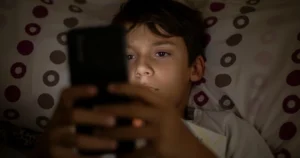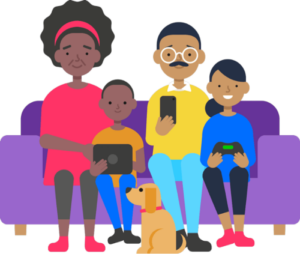As hate speech and trolling become more common online, our experts provide advice on how parents can play a role in supporting young people on this issue.
How might young people come across hate speech online?
Young people are connected more than ever before and while this can be a huge benefit in linking them with friends, communities, loved ones and knowledge, it can, of course, be problematic in that they are exposed to an almost constant stream of information which they may not have the critical skills to filter and navigate.
With the growth of social media, many children will, unfortunately, come across hate speech online, and we must ensure that young people are aware of what they should do if they come across online hate speech. If children see hate speech online, it is paramount that they tell someone they trust be that a parent or a teacher, for example.
How does hate speech impact young people?
Many young people have a clear digital identity which very often reflects the core of who they are. For example, they may not be ‘out’ as LGBTQ+ offline but are in their online life. If this is attacked, it hits very hard at a unique part of themselves that they should rightfully be proud of. To be exposed to any form of hate speech that attacks their community or identity is painful and can sadly lead to some not wanting to ‘reveal’ that part of themselves. If they witness a wider group of people they relate to being attacked, is it any wonder they can begin to feel negatively towards that characteristic?
This directly affects their self-esteem and self-worth and has very real impacts on their mental wellbeing with many reporting high rates of anxiety and depression. At Ditch the Label, we work hard to empower young people to celebrate who they are and to understand that the issue lies solely with the person directing hate at them – and they should never have to feel that they need to change who they are. If they are being targeted in an offline environment in addition to online, there can often be no escape from the abuse and this amplifies the impacts.
What should children do to tackle online hate?
Most of the social media platforms have reporting processes and each has their own guidelines around hate speech and incitement to violence or abuse whether this is in the form of written words or imagery on public platforms. This procedure also considers what may be considered freedom of speech. If in doubt, always report and their moderators will investigate and additionally this helps to refine the reporting systems to encompass emerging trends and adapt accordingly.
There may be times when it may be difficult to navigate the reporting procedures or you may not be happy with the outcome. If you are unable to get harassing, abusive or hate content removed then you can contact us here. Ditch the Label are Trusted Flaggers across all the major platforms which means that we can often get content removed quickly, even if it has already been reported to no avail.
Our trained mentors can provide support on the issues that affect young people here. They can support not only in the removal of content, but in providing support in order to move forward.
With the growth of social media, many children will, unfortunately, come across hate speech online, and we must ensure that young people are aware of what they should do if they come across online hate speech. If children see hate speech online, it is paramount that they tell someone they trust be that a parent or a teacher, for example. This is important for a number of reasons; firstly, the hate speech must be reported to the appropriate body. Secondly, it is important to tell an adult to talk through what the child has seen – this is the case even if the hate speech does not directly affect the child it is still important for the child to understand that what has been said is hateful and wrong, going against the majority of society’s values. If the hate speech has directly affected the child it is important they talk through how it has made them feel and what can be done to help them deal with these feelings.
How can parents help children understand the impacts of online hate?
We always recommend having open and honest conversations with young people about their online lives and experiences just as they do their lives at school or college. Ask them what platforms they are using and if they know how to report if anything happens. Have these conversations regularly rather than wait for a problem to occur and ensure they know they can come to you with any problems and you will be there to support them.
These initial conversations don’t necessarily have to be serious and heavy – they can just as easily be had in regular conversations at the dinner table or while watching TV. In fact, this approach very often removes any pressure to share with you any concerns they might have.
If they do tell you that they are worried about something, give them the time to explain and really listen. Try not to be angry if you feel they shouldn’t have gone onto a particular platform or website or they shouldn’t have shared or posted something. They are then far more likely to open up to you and share what is going on. Make yourself aware of the platforms they are using and if you are able to, spend time with them using a particular game or platform.
Any hate directed at them should be taken very seriously just as it would if it were occurring offline. Remind them that they are not at fault. It may need to be reported, not just to the platform it occurred on, but to the police in some cases as a hate crime.
In today’s internet society, online hate speech (hateful, racist or sexist comments) is something that our children and young people are increasingly viewing and sometimes experiencing. Governments around the world are increasing legislation to combat online hate speech and social media companies are increasing protections on their platforms.
While these are commendable actions, parents may be called upon today to support their children until online hate speech is eradicated. As with all challenges related to parenting a child in the digital age, parents can use this topic as a conversation starter. Parents can then use the discussion as a way to express their family and cultural values, provide children with strategies to combat online hate speech as well as emphasise the importance of empathy and kindness.
Suggested conversation starters:
- What is online hate speech?
- Have you ever encountered online hate speech? How did you feel?
- What should you do if you see online hate speech?
- Do you know how to report/block online hate speech on different platforms?
- How do you think the person felt who wrote the online comment? How do you think people feel when they read the online comment?
- How can we spread kindness and compassion online?
Parents should also check out the Hacking Hate online toolkit produced by European Schoolnet, UK Safer Internet Centre, The Diana Award and other partners. The toolkit looks at how young people can combat online hate and how to effect change in our communities.








